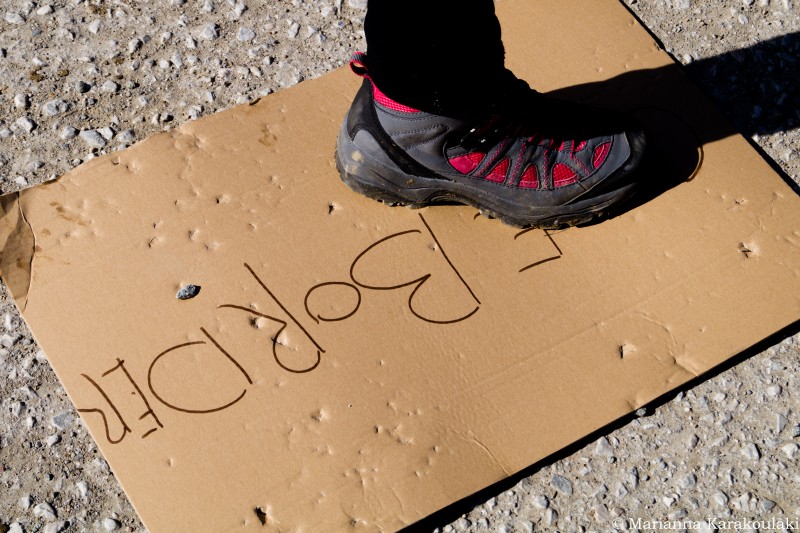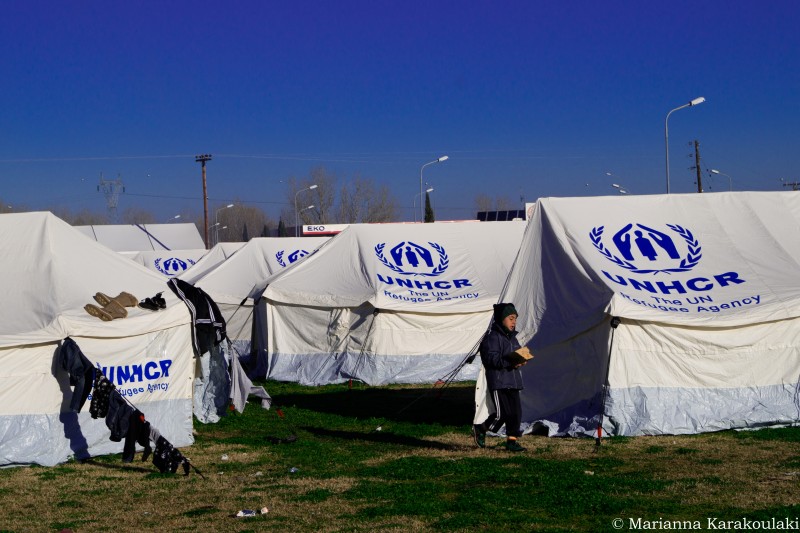
Photo by Marianna Karakoulaki.
In recent months, scores of refugees have fled their war-torn homes in the Middle East, risking their lives to cross into Europe, hoping to find security for themselves and their families.
The road to Europe isn't paved with rose petals, however. Since November, only three nationalities—Syrians, Iraqis, and Afghans—have been allowed to pass into Europe through the precarious “Balkan Route.” Now this road is becoming even more precarious for Syrian and Iraqi refugees, following new requirements set down by several Balkan countries that asylum seekers must show their passports or ID cards, along with papers they receive in the Greek Islands. Refugees carrying Turkish visas, meanwhile, are no longer being permitted into northern Europe, and the Republic of Macedonia has closed its borders entirely to displaced Afghans.
Situated at the Greek-Macedonian border and serving as the main exit point for refugees and migrants into the European mainland, Idomeni has witnessed changes like nowhere else in Greece. Before the crisis, the area was under the control of smugglers. More recently, it's hosted a transit camp and now a military post.
Channel 4 News reported on a journalist’s efforts to track down kidnappers holding migrants for ransom:
As Idomeni swells with refugees, another camp with temporary accommodations has been established 20 kilometers (12.4 miles) from the area, in the empty parking lot of a gas station.

A boy carries a piece of wood for a fire near the tent where he's living, 20 kilometers from Idomeni. Photo by Marianna Karakoulaki.
With limited information and exhausted after sleeping inside unheated buses and tents, thousands of asylum seekers decided to walk the 20 kilometers to Idomeni, where a full camp and a slow border-check procedure awaited them.

Thousands of people walk 20 kilometers, in order to reach the border crossing at Idomeni. Photo by Marianna Karakoulaki.
The “Are You Syrious” Facebook page says only 500 people were allowed into Macedonia between 6 a.m. and 6 p.m. on Monday, February 22. According to reports, police and military officials arrived at the border and proceeded to examine everyone's documents and identity cards in excruciating detail.

Syrian and Iraqi refugees wait in line for hours, until their papers are checked by the Macedonian police and army. Photos by Nicolas Economou, used with permission.
Refugees from Afghanistan waited in line, unaware that they wouldn't be allowed to cross the border. “We came here on Saturday. Why don’t they let us pass?” a teenage Afghan boy named Sam asked Global Voices’ reporter on the ground. “Let us cross and then close the border. I left Afghanistan because there is war there: bombs every day, no jobs, and no future. I need to support my family.”
As the day progressed and little new information reached those in line, tensions mounted and refugees began to protest, demanding entry into Macedonia.

Afghan refugees protest nonviolently, demanding to be let in Macedonia. Photo by Nicolas Economou, used with permission.
Small children carrying handwritten signs demanding open borders moved to the front of the crowd, where they addressed Greek police officers. After a standoff that lasted a couple of hours, the crowd managed to push through the police blockade, making its way to the border crossing, where people smashed a small fence near the train tracks, finally entering Macedonia.

Afghan children hold handwritten banners demanding open borders. Photo by Marianna Karakoulaki.
“I left Afghanistan almost a month ago. I lost my baby, and I am with my husband. Do you know what will happen next?” a woman named Zahra asked in perfect English, which she says she learned by watching movies. “Why is this happening to us? Why don’t they let us cross?”, Zahra desperately asks everyone.

A man holds his Syrian passport (one of the documents that can guarantee passage into Macedonia). Photo by Nicolas Economou, used with permission.
Tensions are expected to continue in Idomeni, where this week's story is likely to repeat itself, as thousands more come looking for safety and a better future. For now, the only hope seems to be a passport.







4 comments